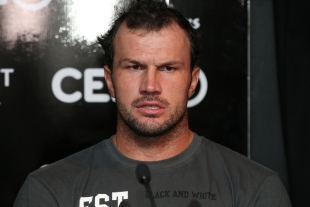|
Super Rugby
Bismarck du Plessis banned for four weeks
ESPN Staff
March 23, 2015
Sharks 12-11 Chiefs (Australia only)
Bismarck du Plessis will miss four Super Rugby matches after pleading guilty to kicking Chiefs No 8 Michael Leitch in the head. The Sharks and Springboks hooker was red-carded in the 18th minute of the match against the Chiefs at Kings Park on Saturday, and his four-week ban sees him sitting out home fixtures against Western Force, the Crusaders and the Bulls, and the Lions at Ellis Park. Chiefs hooker Hika Elliot, meanwhile, has banned for one week for his shoulder charge on Tenadai Mtawarira that saw him red-carded in a feisty fixture in Durban. Du Plessis said in a statement that he would reflect during his suspension "on my actions as both a leader and role model in the game". "I am painfully aware that people have lost faith in my character and the values I claim to stand for," du Plessis said. "I intend to rectify that through actions going forward and not merely words."

The Sharks' Bismarck du Plessis faces the press
© Getty Images
Enlarge
SANZAR duty judicial officer Adam Casselden ruled that du Plessis' kick was "pre-meditated, intentional and unprovoked". "It was reckless, that is the player knew - or should have known - there was a risk of committing an act of foul play. In my opinion the offence was a grave one and the possibility of serious injury existed. The Chiefs No 8 was in a vulnerable position on the ground. He did not see the kick, even if he had, he had limited means available to him, given the position of his arms and body, to protect himself from the player's actions. 'Whilst the player claims he was frustrated by Chiefs No 8 not releasing him from the tackle earlier that does not, in my opinion, entitle him to retaliate by kicking his opponent in the area of the head with a studded boot. The head is of course sacrosanct. "Mr Swart, the player's representative, submitted that the offence was in the lower end of seriousness, particularly given no injury was sustained by Chiefs No.8. I was unable to accede to that submission. Whilst it was fortunate that the player did not sustain an injury, he was nonetheless placed in a vulnerable position and the risk of him sustaining an injury to his head including in and around the eye area was clearly present. Accordingly, I found that the offence should be categorised as a mid-range offence and that the entry point of an eight-week suspension was the relevant starting point. "I was informed that the player was suspended for three weeks in 2008 for dangerous contact to the head area of an opponent. Apart from that indiscretion, the player has not been found guilty of any foul play. In 2012 he received two yellow cards - a red card offence - in the one Test match against New Zealand which resulted in him being ordered off the playing enclosure. At the subsequent judicial hearing there was a finding by the judicial officer that the referee's decision to issue one of the yellow cards was wrong. As a result, the red card issued in that Test match was expunged from his record. "Although the player was suspended seven years ago for dangerous contact to the head of an opponent that does not, in my opinion, categorise the player as a repeat offender of the game to warrant any uplift on the entry point as an aggravating factor." 'Since 2008 it seems he has been a model player and in my opinion, no other aggravating factors existed for consideration other than those which were taken into account in determining the appropriate entry point." © ESPN Sports Media Ltd
|
Live Sports
Communication error please reload the page.
-
Football
-
Cricket
-
Rugby
-
- Days
- Hrs
- Mins
- Secs
F1 - Abu Dhabi GP
Abu Dhabi Grand Prix December 11-131. Max Verstappen ()
2. Valtteri Bottas (Mercedes)
3. Lewis Hamilton (Mercedes)
4. Alexander Albon ()
5. Lando Norris ()
6. Carlos Sainz Jr ()
-
ESPNOtherLive >>
Golf - Houston Open
Snooker - China Open
Tennis - Miami Open

